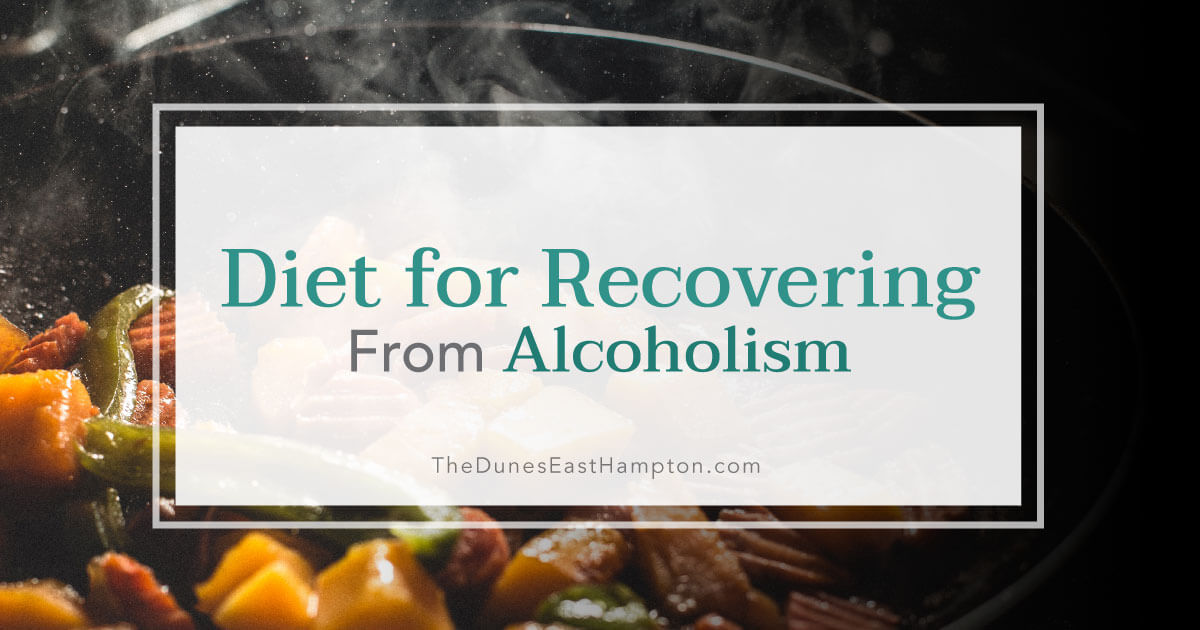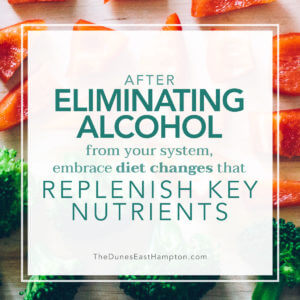 Why you may want to be on a recovering alcoholic diet. Alcohol use affects the mind and body. Prolonged and excessive alcohol use can lead to nutritional deficiencies that takes time to heal. After eliminating alcohol from your system it’s important to embrace a diet for recovering from alcoholism and lifestyle changes that replenish key nutrients, including vitamins and minerals.
Why you may want to be on a recovering alcoholic diet. Alcohol use affects the mind and body. Prolonged and excessive alcohol use can lead to nutritional deficiencies that takes time to heal. After eliminating alcohol from your system it’s important to embrace a diet for recovering from alcoholism and lifestyle changes that replenish key nutrients, including vitamins and minerals.
The Connection Between Alcohol Abuse and Nutritional Deficiencies
Alcohol affects each person differently, but over time, it always leads to nutritional deficiencies. The liver processes alcohol, and when the liver loses its reserves of nutrients used to break down the alcohol, it draws resources from other areas of the body. In addition to the effects of alcohol on the liver, excessive alcohol use also harms the stomach, intestines, and pancreas. Eventually, alcohol abuse inhibits the body’s ability to absorb much-needed nutrients from foods and supplements. It may also worsen existing absorption and metabolism issues.
Replenishing Nutritional Deficiencies
In addition to replenishing nutrients lost due to heavy alcohol consumption, rebuilding nutrients in the body can help combat many of the underlying causes of addiction such as mood fluctuations, depression, and fatigue. Take time to understand nutritional deficiencies and address them with positive dietary changes for energy stability, mood management and general wellness.
 Food Sensitivities and Alcoholism
Food Sensitivities and Alcoholism
Many alcoholics struggle with food sensitivities. Correcting food sensitivity can decrease cravings for alcohol and unhealthy foods. While you should discuss your dietary needs with your doctor or a recovery nutritionist at The Dunes East Hampton, many in recovery benefit from beginning a diet for recovering from alcoholism that focuses on whole foods and excludes gluten, sugar, and processed carbohydrates. Since some food sensitivities can worsen existing nutrient absorption problems, your nutritionist may recommend a food-restricted diet to ensure maximum absorption of vitamins and minerals.
Necessary Vitamins in a Diet for Recovering from Alcoholism
Best vitamins for recovering alcoholics? In recovery, finding the most nutrient-rich whole foods can enhance your body’s ability to replenish vitamins and minerals. A diet for recovering from alcoholism should work to repair and replenish the body. Consider this list of the most common deficiencies associated with alcohol consumption and whole foods designed to replenish nutrients:
- Vitamin A – This essential vitamin improves eyesight, strengthens the immune system, and supports the reproductive system. Lack of vitamin A can cause rashes and eyesight problems. Sweet potatoes take the number one spot for whole foods containing vitamin A. One sweet potato contains 561% of the recommended daily value. Leafy greens, liver, and dairy products will also boost vitamin A levels.
- Vitamin B – Excessive alcohol consumption can affect the absorption of all B vitamins, including thiamine (B1), folate, B12, riboflavin (B2), and pyridoxine (B6). B vitamins affect brain health, cellular functioning, and more. Deficiencies cause depression, fatigue, muscle weakness, and many other problems. Increase your intake with recommended supplements and whole foods such as chickpeas for B6, clams or salmon for B12, beans or nuts for B1, and milk or lamb for B2.
- Vitamin C – staves off scurvy, improves bone and tissue repair throughout the body, and decreases free radical levels. A deficiency can inhibit a person from healing quickly. Some of the best sources of vitamin C include red bell peppers, kiwi fruit, broccoli, and oranges.
- Vitamin D – supports bone health and calcium absorption. A deficiency can cause pain, brain fog, and weakness. Fatty fishes naturally contain vitamin D. Other sources of vitamin D include fortified dairy products and supplements. While the sunshine can help the body create vitamin D, most people also need to supplement with whole foods.
- Magnesium – supports muscle, nerve, and heart functions. The human body needs this mineral for hundreds of biochemical reactions. A deficiency can cause anxiety, irregular heartbeat, and muscle cramps. Find magnesium in cashews, spinach, and whole unrefined grains.
- Calcium – fortifies the skeletal system, improves cell communication, and supports hormone secretion in the body. Eat plenty of yogurt and dark, leafy greens to boost levels of this mineral in the body.
- Iron – iron supports the flow of oxygen in the body, and many women suffer from iron deficiency. A deficiency in this nutrient can cause anemia and fatigue. Chicken liver, red meat, fish, and lentils can replenish this much-needed nutrient.
Nutrition Support at The Dunes East Hampton
Navigating nutritional support during recovery can seem daunting at first. At The Dunes East Hampton, a team of recovery-focused nutritionists, gourmet chefs, and addiction treatment specialists plan and prepare all the meals for our clients, customized to each client’s unique dietary needs. This makes it simple to eat a nutrient-dense diet, so you can focus on other aspects of your recovery.
At our luxury rehab center in The Hamptons, we strive to make healthy eating an enjoyable part of an addiction-free life. Once your time with us is complete, we give you the information you need to continue a healthy diet at home.
For all your nutrition help, have The Dunes East Hampton help you with your recovery!







